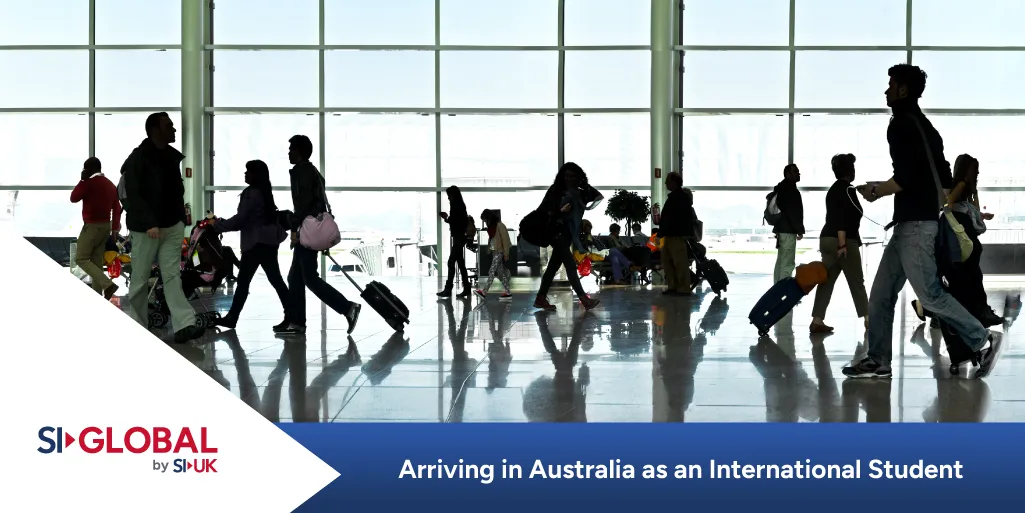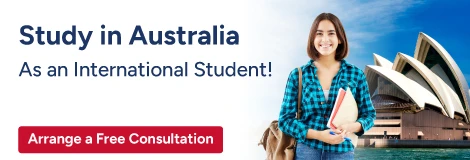Your visa is done, flights are booked, and you are ready to move to Australia for your studies. But have you made all the necessary arrangements for your first week in the country? Moving to a new country can be challenging and exciting, so we’ve created this quick checklist to help you check things off.
Before you are ready to move to Australia, make yourself comfortable by planning your initial days there. Many Australian universities and institutions help international students by offering airport pickup, arranging temporary accommodation, and offering an orientation session. Below is a general checklist that you should familiarize yourself with.
Arrange a free consultation with SI-Global today to study in Australia. Our educational consultants will explain your study options in Australia and help you apply.

Before Travel
- Document checklist
Keep the original documents in your carry-on luggage and photocopies in your check-in luggage.
- Valid passport with a valid Australian student visa
- Offer letter from the Australian university, Confirmation of Enrolment (CoE), and confirmation of your airport pickup by the institution with accommodation details
- Receipts of tuition fees and health cover
- Attested mark sheets and certificates along with work experience letters
- Other essential documents, like a driver's license, birth certificate, and ten passport-size photographs
- Health insurance details
- Important telephone details and addresses in India and Australia
- Medicine prescriptions
- What to pack?
While packing, keep the items you might need to declare at customs easily accessible. The check-in weight for economy class is 20 kg (you can check it with the baggage allowance with your airline). Here are the list of the items that you can pack -
- Required clothing, footwear, and personal items, such as toiletries and medications.
- Backpack, stationery, blanket, pillowcases, towels, and alarm clock.
- Electrical appliances like laptops, music systems, and cameras with valid bills. Australian voltage is 240 Volts, the same as India's, but you will require a different plug or socket.
Arriving in Australia
Filing for Custom Declaration
Before arriving in Australia, you will be given a customs declaration form on the aeroplane. The form requires you to declare any food or other prohibited items from entering Australia. If you carry any item that is not allowed, you must declare them and pass them through the Red Channel, where an Australian Customs Officer will inspect the goods you have stated. You can pass them through the green channel if you have nothing to declare. You can import goods worth AUD 400 if you own them for less than 12 months. Anything above that is taxable.
Airport Pickup and Collection of Required Documents
If you have booked an airport pickup, the university representative will arrive to assist you. If you have booked temporary accommodation, you will be taken there. Phone cards, widely available in Australia, can be used to contact your family. Inform your institution of your arrival and attend the orientation session given by the university. Local telephone calls are charged AUD 0.25.
Collect your Overseas Student Health Cover (OSHC) receipt when you arrive at your university or institute. Confirm your OSHC at the nearest Medibank Office or its customer service centre. You are covered by health insurance from the moment you arrive in Australia.
Applying for Work Rights
As an international student, you can apply to the Australian Government Department of Immigration and Citizenship (DIAC) for a permit to work in Australia. You can work 20 hours per week during your studies and full-time during vacations. The charge for applying for a work permit is AUD 50. You can apply for a work permit once you arrive in Australia. However, you will have to pay Australian taxation and apply for the following -
- Tax File Number (TFN) and submit the TFN application form to the Australia Taxation Office
- TFN number is also required while applying for a bank account
Exchanging Foreign Currency and Opening a Bank Account
Foreign exchange facilities are available at all international airports and through banks operating in Australia. Make sure that you set up an Australian bank account so that you can track down your transactions. To open a bank account, you must fill out a bank application form and submit details, such as passport, student ID, and tax file number.
Banking hours in Australia are 9:30 a.m. to 4:30 p.m. (Monday through Thursday) and 9:30 a.m. to 5:00 p.m. on Fridays. All universities have a branch office in a major Australian bank near the campus. ATMs are also available in different areas.
Know How to Drive? Apply for a Driver’s License
If you know how to drive and live in Australia for over three months, you must apply for a valid driver’s license. These are provided through individual state and territory government bodies.
- Australian Capital Territory
- Tasmania
- Western Australia
- New South Wales
- Victoria
- South Australia
- Queensland
- Northern Territory
The documents required include proof of residency/visa, a government ID or passport, and a fee of $50-$150, depending on your residence. You must attend an appointment, take a photo, complete an eyesight test, and pay the fee. The details will be sent to your mail. International applicants over 25 years old will have to take a physical examination.
Study in Australia
Do you want to join the thousands of other international students broadening their horizons by study in Australia? Arrange a free consultation with SI-Global to begin your journey.






















































































